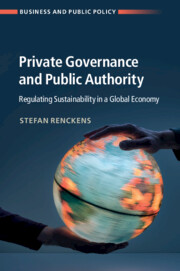Book contents
- Private Governance and Public Authority
- Business and Public Policy
- Private Governance and Public Authority
- Copyright page
- Contents
- Figures
- Tables
- Acknowledgments
- Abbreviations
- 1 Introduction
- 2 Explaining Public Interventions in Private Governance
- 3 Organic Agriculture
- 4 Biofuels
- 5 Fair Trade
- 6 Fisheries
- 7 Evaluating Public Interventions in Private Governance
- Appendix Interviews
- Endnotes
- References
- Index
6 - Fisheries
Published online by Cambridge University Press: 02 April 2020
- Private Governance and Public Authority
- Business and Public Policy
- Private Governance and Public Authority
- Copyright page
- Contents
- Figures
- Tables
- Acknowledgments
- Abbreviations
- 1 Introduction
- 2 Explaining Public Interventions in Private Governance
- 3 Organic Agriculture
- 4 Biofuels
- 5 Fair Trade
- 6 Fisheries
- 7 Evaluating Public Interventions in Private Governance
- Appendix Interviews
- Endnotes
- References
- Index
Summary
The chapter explains why the EU has so far failed to intervene in private fisheries governance. The chapter starts with comparing private governance schemes since the 1990s. It then analyses EU policy discussions until late 2017, showing that until very recently all involved stakeholders agreed that the fragmentation of the private governance market needed to be addressed. Differences of opinion on the desirability of publicly supporting product differentiation, however, have continued to exist. While most stakeholders consider the costs such differentiation would impose on European producers too high and therefore support procedural regulation, the European Parliament has consistently favored both standards and procedural regulations in the form of an EU-level certification and eco-labeling scheme. Attempts to create a policy failed in 2008–2009 when a legislative proposal for procedural regulation was abandoned, and in 2013 when the discussion was integrated in the reform of the Common Fisheries Policy. A 2016 report on feasible policy options, moreover, questioned the fragmentation of the private governance market, casting further doubt on the likelihood of public intervention.
Keywords
- Type
- Chapter
- Information
- Private Governance and Public AuthorityRegulating Sustainability in a Global Economy, pp. 162 - 191Publisher: Cambridge University PressPrint publication year: 2020

